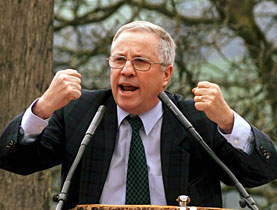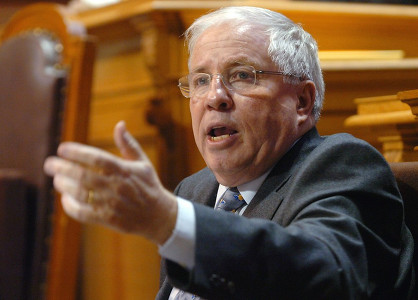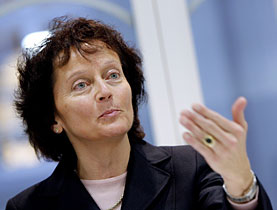Third woman enters the cabinet

Eveline Widmer-Schlumpf has been sworn in as a member of the seven-person cabinet, replacing controversial People's Party colleague Christoph Blocher.
The rightwing People’s Party announced it was pulling out of the four-party government in protest at the exclusion of Blocher, who failed to win re-election on Wednesday.
“You have accorded me a great task with great responsibilities and I can only accept if I can count on your support,” Widmer-Schlumpf told parliament as she accepted her nomination. The politician, who is viewed as more moderate than Blocher, added that she had been very surprised by the turn of events.
Her acceptance of a place in cabinet threatens to increase political instability in the country.
The head of the People’s Party parliamentary group, Caspar Baader, told the assembly on Thursday that Widmer-Schlumpf – and her party colleague in the cabinet, Samuel Schmid – would now be excluded from the group.
Not an easy time
Addressing journalists in Bern, the new cabinet member admitted that she would not have an easy time in government, “especially with a group that doesn’t support me”.
She said she would try to maintain contact with the People’s Party “as I believe that we can only progress through dialogue”, and forge ties with other parties.
She also indicated that the People’s Party president had been aware of the possibility of her election, but felt it was too improbable.
Blocher made a short speech in parliament in which he said that although he was now out of the cabinet, he was still a force in politics.
“I feel a mixture of indignation and relief… indignation at the way in which I was not re-elected, as you didn’t tell me the reasons… and relief because I can once again say what I think and talk about things that I couldn’t owing to consensus and collegiality,” said Blocher.
People’s Party minister Samuel Schmid told journalists that, despite the decision to exclude him from the party’s parliamentary group, it would not make a huge difference to him as a cabinet member and he would not be changing parties.
“I know that I am also supported by a large part of the population,” he added.
The change was hailed as an advance for women, who now hold three of the seven cabinet seats – the highest ever share.
Some 1,500 demonstrators, including many women and young people, celebrated the news outside the fenced-off parliament building in Bern on Thursday.
swissinfo with agencies
The four main political parties have been represented in the seven-member Swiss government for nearly 50 years.
The party-political make up remained unchanged between 1959 and 2003, when Christoph Blocher won a second seat for his party at the expense of the centre-right Christian Democrats.
The four main parties have an 80% majority in parliament, while the Greens are the largest opposition party with around 10%.
Over the past 15 years the People’s Party has gradually increased its share of the vote to 29% in October’s parliamentary elections.

In compliance with the JTI standards
More: SWI swissinfo.ch certified by the Journalism Trust Initiative












You can find an overview of ongoing debates with our journalists here . Please join us!
If you want to start a conversation about a topic raised in this article or want to report factual errors, email us at english@swissinfo.ch.